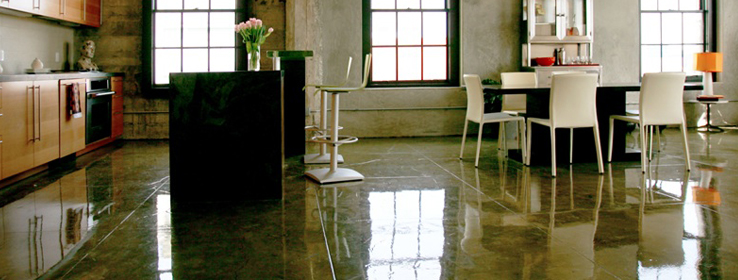Learn how to enhance and preserve your work by matching the right sealer to each job.
Versatile, durable and economical, concrete is starring more and more often as a finished floor. In both residential and commercial applications, the creative use of stains and dyes can produce a broad range of aesthetic effects suitable for almost any interior setting. To enhance and maintain the beauty of these floors, it's always wise to apply a clear sealer to the concrete.
H&C Clear Sealers for Interior Concrete
H&C has products for a wide range of residential and commercial applications. Learn more about the sealers listed here plus others.
Residential-grade sealers:
H&C® Concrete Sealer Wet Look: a single-component, water-based acrylic sealer that dries to a durable, glossy finish. Apply by brush, roller or spray in just one coat and clean up with soap and water.
H&C® Concrete Sealer Oil-Based Clear Gloss: a solvent-based product formulated with a silicone acrylic resin. Its high-gloss finish stands up to heavy traffic and can be used on vertical or horizontal surfaces.
Commercial-grade sealers:
H&C® 2-Part Self-Leveling Epoxy Clear Coat: create a durable, low-maintenance surface in warehouses, showrooms, commercial kitchens or offices. An excellent choice over H&C concrete overlays.
H&C® High Performance Industrial Clear Coat: a single-component, solvent-based urethane sealer for high-gloss protection over bare concrete or over decorative dyes and stains. Use it on heavy-duty applications such as schools, warehouses, retail stores and airplane hangars.
H&C® 2-Part Polyurethane Clear Coat: in either gloss or satin finish, get the durability and performance of a solvent-based system, but with the easy application and clean-up of water-based products.
Clear sealers serve a multitude of functions on interior concrete floors, including:
Protecting the concrete substrate against penetration and staining.
Increasing durability and protecting against wear and tear.
Enhancing the appearance of the concrete.
Making it easier to clean.
Before you determine which sealer will best preserve that functionality, consider the following points.
Ask critical questions
Brian P. Whewell, technical product manager for H&C Decorative Concrete Products, offers this advice to contractors trying to choose among the wide range of clear sealers available. "First, determine the look you or your customers are going for: Do you want a matte, satin or glossy finish? Do you want to retain the color of the unsealed concrete, or do you want the finish coat to deepen and enrich the colors of the floor?"
Next, Brian advises that you consider the amount and type of traffic the floor will be subjected to: Is it in a single-family home with only light foot traffic or in a busy restaurant or store? Will there be wheeled carts or other equipment rolling across the floor? Is it in a garage, exposed to oil and grease stains or deicing salts dripping from a car, lawn mower or snow blower? How often and how vigorously will the floor be cleaned?
Finally, look at the occupancy of the project: Is it important to keep the application and cure time to a minimum? Is it necessary to meet certain VOC or environmental regulations?
"Answering these questions can help ensure that the sealer you choose will meet expectations for appearance and performance," Whewell says.
Residential floors
For a simple residential project that only has to stand up to foot traffic, you'll probably want to use a water-based, single-component sealer, such as H&C® Concrete Sealer Wet Look. "Latex acrylic sealers are easy to apply, user-friendly and suitable to use over a variety of substrates — wood as well as concrete," Whewell says. On the other hand, these low-end sealers will require more frequent reapplication — maybe every two or three years. Water-based acrylics won't change the color of the concrete.
The next level of product is a solvent-based acrylic sealer. These sealers will provide an extra two or three years of service life, compared with water-based acrylics. They also produce a different aesthetic effect, whether or not the concrete has been color-treated with stains or dyes. Solvent-based acrylics will darken the surface and make colors pop. Whewell suggests H&C® Concrete Sealer Oil-Based Clear Gloss for a high-grade shine. Just be sure to use proper ventilation when applying it indoors.
Gloss levels in both of these products vary based on the percentage of resins in the product formula. A high-gloss finish can usually be achieved by applying two coats of a high-resin product. Sealer labels and literature will clearly indicate the level of gloss a product will produce.
Commercial floors
"In the commercial realm, where floors are subjected to heavier traffic and more frequent cleaning, it's best to choose a more durable clear sealer," Whewell says. Consider water- or solvent-based two-component epoxies like H&C® 2-Part Self-Leveling Epoxy Clear Coat and one- or two-component urethanes, such as H&C® High Performance Industrial Clear Coat or H&C® 2-Part Polyurethane Clear Coat. Water-based sealers can be an advantage if there are occupied spaces nearby.
Because material costs don't differ greatly among the various products, Whewell suggests going with the most durable one that meets the project requirements. "That's the best way to satisfy your customers and reduce the likelihood of callbacks," he says.
Get the technical support and information you need about decorative concrete sealers from your H&C sales rep or a sales person at your local Sherwin-Williams store. With 3,900 locations, it's easy to find one near you.




